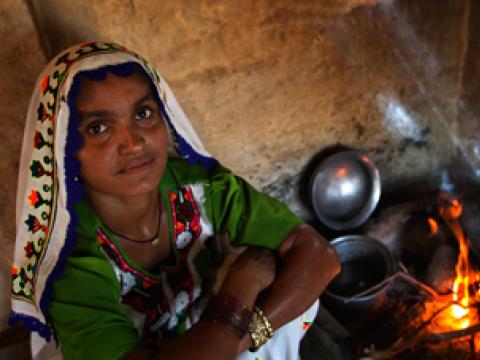The key to reviving Pakistan's immunisation programme

Shankotila Bai, Lady Health Worker
A team of over 100,000 trained female community workers delivering basic health services door-to-door hold the key to reviving Pakistan’s immunisation programme
Draped in a traditional bright sari but bearing the modern tools of a vaccinator, 30-year-old Shankotila Bai has the past and present weighing heavily on her shoulders.
For a country where vaccines are widely available, Pakistan’s recent record on immunisation is poor with only half of its children fully immunised. Now, Bai and the other 100,000 trained Lady Health Workers in Pakistan are expected to increase immunisation coverage rates the hard way – by walking door to door.
Bai’s daily objective is to visit 8 to 10 families in her home village of Mithrio Bhatti, located in the Thararkar district of Sindh Province. Priority is given to vaccinating all children and mothers who have not been to the nearest health clinic in Mithrio for their immunisations.
Mithrio Bhatti is a poor village, but a calm one, where Hindus and Muslims live peacefully side-by-side. Equipped with a cold box and a medical bag, Bai will make three stops before lunch time.
Get up to speed
One of her visits is to Seeta Bai, 27, whose infant son Jetesh was born with the help of a local dai (traditional birth attendant). Wearing a black taweez to ward off evil spirits, the mother appears tired and weak. She had not brought her child to the health clinic for vaccination.
Now Jetesh will need to get up to speed, starting with oral polio vaccine and followed by injectable pentavalent vaccine in the right thigh and pneumococcal vaccine in the left. Cuddling the baby to her breast, Seeta looks askance as each jab is administered.
At stake
Now poised to enter its third decade and a model for developing countries worldwide, the Lady Health Worker programme is seen by Pakistan’s government as critical to reaching more children with immunisation.
Much is at stake. With some five million babies born every year and unrelenting challenges like flash floods and the presence of one million internally displaced persons, Pakistan is also confronting the spread of preventable communicable diseases.
For example, since October 2012, the country has seen over 20,000 suspected measles cases and some 500 measles deaths. A nationwide review showed the measles vaccine was available – but children simply were not getting it.
Lady Health Workers have been salaried government employees since January 2013, but the path to attaining this status was not without obstacles.
In its early days, the programme had only quasi-official rank. Later it was devolved from the central government to the country’s provincial authorities, after which it was suspended for two years.
Training
Like other Lady Health Workers across Pakistan, Bai attended a six/month course preparing her to attend to the basic health needs of the women and children among the 2,000 people living in her village.
Some particularly well-educated workers, like Bai – who completed grade 12 - have received training that qualifies them to give vaccines.
The real strength of the Lady Health Workers lies not just in their training but also their role as trusted members of the community they serve.
Health house
When she is not making door-to-door visits, Bai operates out of a clinic she calls the Health House – in reality, a spare room in the house she has called home since marrying local tailor Halo Mai and where she brings-up her own three children.
Before she starts work as a health worker at 8am each day, Bai has already milked the goat, prepared and served her family’s breakfast of chapatti, chutney and yoghurt drink; fed the cattle; and done her housework.
It is a daily routine she shares with many other women in her village and brings the trust and respect essential for the success of her main role: health education.
Spread awareness
As a Lady Health Worker, Bai must spread awareness among women of child-bearing age about hygiene, immunisation, pre- and post-natal care, nutrition, family planning and the services available to them at nearby health centres.
Against the pale desert background, women dressed in vibrant colours arrive, greet Bai and then sit in a semicircle in her Health House.
As she shows them a book of illustrations, she exhorts mothers to take their babies to the health centre six times within the first 15 months of birth. These six visits, she says, will protect every child from nine illnesses including pneumonia – which all of the mothers know and fear.
Pneumonia remains the number one cause of death among young children in Pakistan, but in 2012, with support from GAVI, Pakistan became the first South Asian country to introduce the pneumococcal vaccine. By training Bai and 100,000 Lady Health Workers, the foundations are now in place to ensure this life-saving vaccine can reach every Pakistani child.
*Original article posted by GAVI Alliance. You can read it HERE.